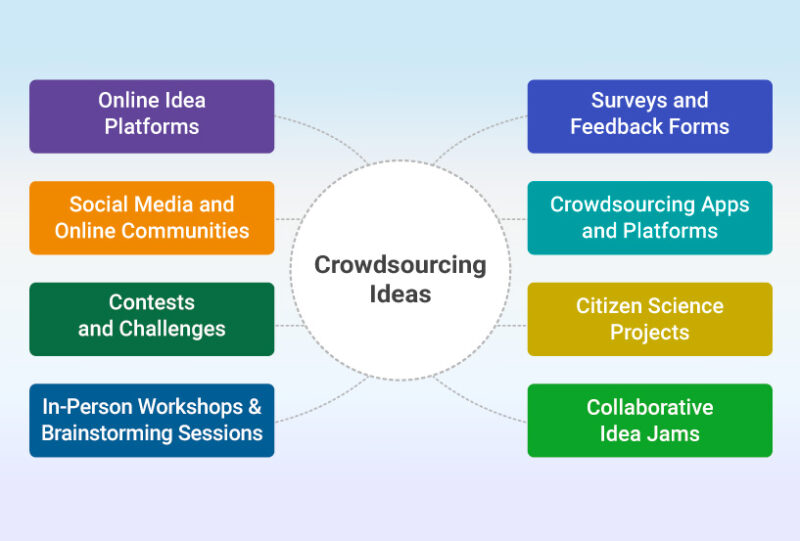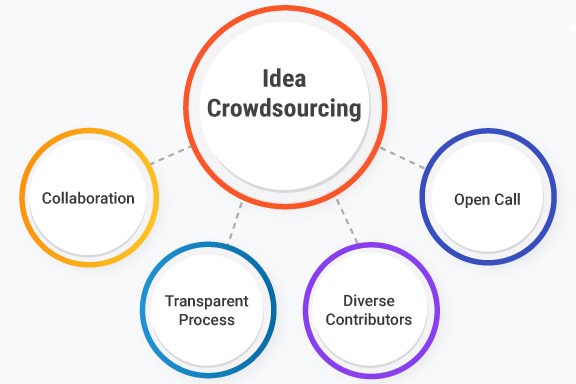Table of Contents
What is Idea Crowdsourcing?
Idea crowdsourcing is defined as a process that involves soliciting ideas, solutions, or suggestions from a diverse group of individuals, often through online platforms or social media. The goal is to tap into the collective intelligence and creativity of a large and diverse community to address specific challenges, generate new concepts, or identify innovative opportunities.
Key Components of Idea Crowdsourcing:
-
Open Call: Idea crowdsourcing typically begins with an open call for contributions from a wide audience. This can be done through websites, social media, or dedicated platforms designed for idea crowdsourcing.
-
Diverse Contributors: The success of idea crowdsourcing relies on attracting contributors with diverse backgrounds, experiences, and perspectives. This diversity enriches the pool of ideas and fosters innovation.
-
Transparent Process: Transparency is crucial to the credibility of the crowdsourcing effort. Participants should understand the guidelines, criteria for evaluation, and potential rewards or recognition for their contributions.
-
Collaboration: Idea crowdsourcing often involves collaboration and discussion among participants. This collaborative element can help refine ideas and build upon each other’s insights.
Benefits of Idea Crowdsourcing:
-
Diverse Perspectives: Idea crowdsourcing allows organizations to tap into a vast pool of talent and perspectives. Contributors from different backgrounds and industries can offer fresh and innovative viewpoints that may not be apparent within a closed internal team.
-
Cost-Effective: Traditional research and development processes can be costly and time-consuming. Idea crowdsourcing can be a more cost-effective way to generate ideas and solutions, as it leverages the collective power of volunteers or a minimal financial investment.
-
Rapid Innovation: With a large and engaged community, idea crowdsourcing can generate a rapid flow of creative ideas. This can accelerate innovation cycles and help organizations stay ahead in competitive markets.
-
Engagement and Brand Loyalty: Organizations that involve their stakeholders in idea crowdsourcing can build stronger connections and loyalty among their customers, employees, and communities. It demonstrates a commitment to listening and acting on feedback.
Learn More: What is Crowdsourcing Innovation?
Crowdsourcing Ideas

Crowdsourcing ideas is a dynamic and collaborative process that allows individuals or organizations to tap into the collective intelligence and creativity of a diverse group of people to generate innovative solutions, brainstorm new concepts, or address specific challenges. Whether you’re seeking fresh perspectives for a business project, looking to solve a complex problem, or aiming to spark creativity, crowdsourcing ideas can be a valuable approach. Here are some effective ways to crowdsource ideas:
1. Online Idea Platforms
- Idea Management Software: Consider using dedicated idea management platforms like IdeaScale, Brightidea, or Spigit. These tools provide a structured framework for collecting, evaluating, and implementing ideas from contributors.
- Crowdsourcing Websites: Websites like Kickstarter and Indiegogo allow you to crowdsource funding for creative projects, but they also provide a platform for gathering feedback and refining your ideas based on community input.
2. Social Media and Online Communities
- Social Media Polls and Surveys: Platforms like Twitter, Facebook, and Instagram offer polling features that allow you to gather quick feedback and opinions from your followers.
- Niche Forums and Groups: Join relevant online communities, forums, or groups where people with similar interests or expertise gather. Engage in discussions, ask questions, and seek input on your ideas.
3. In-Person Workshops and Brainstorming Sessions
- Team Brainstorming: Organize brainstorming sessions within your organization or with a group of peers. Encourage open discussion and the sharing of diverse viewpoints.
- Hackathons and Innovation Events: Host events like hackathons or innovation challenges where participants collaborate intensively to develop ideas and solutions.
4. Contests and Challenges
- Idea Competitions: Launch idea competitions or challenges with attractive prizes to motivate participants to contribute their best ideas.
- Hackerathons and Coding Challenges: If you’re looking for technical solutions, consider hosting coding challenges that attract programmers and developers.
5. Surveys and Feedback Forms
- Online Surveys: Create online surveys using tools like Google Forms or SurveyMonkey to gather structured feedback and suggestions from a broad audience.
- Customer Feedback: Solicit feedback from your customers through email surveys or feedback forms on your website or product.
6. Crowdsourcing Apps and Platforms
- Waze: Waze is a community-based GPS navigation app that collects real-time traffic data from users to provide accurate traffic information.
- Duolingo: This language-learning app relies on crowdsourcing to translate text on the internet while users learn languages.
7. Citizen Science Projects
- Zooniverse: Zooniverse is a platform that engages volunteers in scientific research, allowing them to contribute to various projects, including astronomy, biology, and climate science.
8. Collaborative Idea Jams
- Virtual Idea Jams: Host online idea jams or brainstorming sessions where participants from different backgrounds come together to generate ideas on a specific topic.
Remember that effective idea crowdsourcing involves clear communication, well-defined objectives, and a mechanism for evaluating and implementing the best ideas. It’s essential to recognize and reward contributors for their valuable input, fostering a culture of innovation and collaboration. Crowdsourcing ideas can be a powerful tool for generating fresh insights, solving complex problems, and driving innovation in various domains.
Learn more: What is Ideation?
Crowdsourcing Business Ideas
Crowdsourcing business ideas is a smart way to gather diverse perspectives and tap into the collective creativity of a broad audience. Whether you’re an aspiring entrepreneur looking for your next venture or an established business seeking innovative concepts, here are some effective strategies for crowdsourcing business ideas:
1. Idea Contests and Challenges
- Idea Pitch Competitions: Organize a competition where individuals or teams submit business ideas. Provide attractive prizes or investment opportunities for the winning concepts.
- Problem-Solving Challenges: Pose specific challenges or problems your business is facing and invite participants to submit innovative solutions.
2. Online Idea Platforms
- Innovation Communities: Join or create online communities dedicated to innovation and entrepreneurship. Platforms like LinkedIn groups or specialized forums can be excellent places to discuss and refine business ideas.
- Idea Crowdsourcing Platforms: Utilize dedicated idea management software like IdeaScale or IdeaChamp to host idea campaigns and gather suggestions from a wide audience.
3. Surveys and Feedback Forms
- Customer Surveys: Send out surveys to your existing customers to gather insights about their needs, pain points, and potential business ideas that could address those issues.
- Market Research Surveys: Conduct market research surveys to understand industry trends and identify gaps or opportunities that your business could exploit.
4. Social Media Engagement
- Crowdsource on Social Media: Leverage the power of social media platforms like Twitter, Facebook, and Instagram to ask your followers for business ideas or feedback on existing concepts.
- Live Q&A Sessions: Host live Q&A sessions or virtual town halls to engage with your audience directly and gather real-time input.
5. Hackathons and Idea Jams
- Hackathons: Organize hackathons or idea jams where participants collaborate intensively over a short period to develop business concepts or prototypes.
6. Industry-Specific Crowdsourcing
- Industry Forums and Associations: Engage with industry-specific forums, associations, and events to connect with experts and stakeholders who can provide industry-focused business ideas.
- Collaborate with Suppliers and Partners: Your suppliers, distributors, and business partners may have valuable insights into potential opportunities or areas for improvement.
7. Academic Collaboration
- University Partnerships: Collaborate with universities or academic institutions to tap into the innovative ideas of students, researchers, and professors.
8. Open Innovation Challenges
- Partner with Other Companies: Consider collaborating with other businesses to create open innovation challenges where participants from both organizations can contribute ideas.
9. Crowdfunding Platforms
- Kickstarter and Indiegogo: Crowdfunding platforms not only help raise funds but can also serve as a testing ground for your business idea’s appeal to the public.
10. Internal Idea Generation
- Employee Suggestions: Encourage your employees to submit their business ideas. They have valuable insights into your company’s operations and may identify areas for improvement or expansion.
Remember to establish clear guidelines, evaluation criteria, and rewards for contributors to incentivize high-quality submissions. Additionally, protect any intellectual property and sensitive information when sharing ideas publicly.
Learn more: What is Product Ideation?
Examples of Idea Crowdsourcing Success

- Open Source Software: The open-source community is a prime example of idea crowdsourcing in action. Thousands of developers worldwide collaborate on projects like Linux and Mozilla Firefox, creating high-quality software that is free and open to all.
- LEGO Ideas: LEGO allows fans to submit their design ideas for new LEGO sets. If a submission receives enough support, LEGO may turn it into a real product. This approach has led to the creation of popular sets like the LEGO NASA Apollo Saturn V.
- NASA’s Challenges: NASA has used crowdsourcing to address complex problems, such as designing a better astronaut glove or finding ways to fold space telescopes. These initiatives harness the expertise of engineers, scientists, and enthusiasts from around the world.
- Innocentive: Innocentive is a platform that connects organizations with a network of problem solvers. Companies like NASA, Procter & Gamble, and Eli Lilly have used Innocentive to crowdsource solutions to their innovation challenges.
Crowdsourcing business ideas can lead to innovative concepts, help identify market trends, and provide valuable feedback from potential customers. By involving a diverse group of individuals and stakeholders, you increase the likelihood of discovering promising opportunities for your business.
Learn more: What is Idea Management?
Most Recent Blogs
Explore the latest innovation insights and trends with our recent blog posts.










